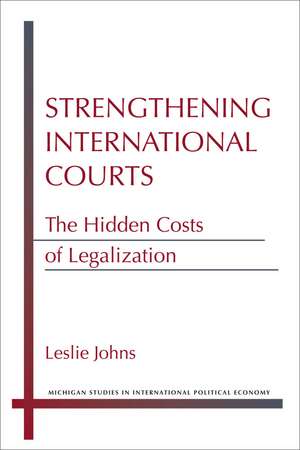Strengthening International Courts: The Hidden Costs of Legalization: Michigan Studies In International Political Economy
Autor Leslie Johnsen Limba Engleză Paperback – 22 ian 2015
As all manner of commerce becomes increasingly global, states must establish laws to protect property rights, human rights, and national security. In many cases, states delegate authority to resolve disputes regarding these laws to an independent court, whose power depends upon its ability to enforce its rulings.
Examining detailed case studies of the International Court of Justice and the transition from the General Agreement on Tariffs and Trade to the World Trade Organization, Leslie Johns finds that a court’s design has nuanced and mixed effects on international cooperation. A strong court is ideal when laws are precise and the court is nested within a political structure like the European Union. Strong courts encourage litigation but make states more likely to comply with agreements when compliance is easy and withdraw from agreements when it is difficult. A weak court is optimal when law is imprecise and states can easily exit agreements with minimal political or economic repercussions. Johns concludes the book with recommendations for promoting cooperation by creating more precise international laws and increasing both delegation and obligation to international courts.
Examining detailed case studies of the International Court of Justice and the transition from the General Agreement on Tariffs and Trade to the World Trade Organization, Leslie Johns finds that a court’s design has nuanced and mixed effects on international cooperation. A strong court is ideal when laws are precise and the court is nested within a political structure like the European Union. Strong courts encourage litigation but make states more likely to comply with agreements when compliance is easy and withdraw from agreements when it is difficult. A weak court is optimal when law is imprecise and states can easily exit agreements with minimal political or economic repercussions. Johns concludes the book with recommendations for promoting cooperation by creating more precise international laws and increasing both delegation and obligation to international courts.
Preț: 235.69 lei
Nou
Puncte Express: 354
Preț estimativ în valută:
45.11€ • 46.92$ • 37.24£
45.11€ • 46.92$ • 37.24£
Carte indisponibilă temporar
Doresc să fiu notificat când acest titlu va fi disponibil:
Se trimite...
Preluare comenzi: 021 569.72.76
Specificații
ISBN-13: 9780472052608
ISBN-10: 0472052608
Pagini: 240
Ilustrații: 13 tables, 17 figures
Dimensiuni: 152 x 229 x 20 mm
Greutate: 0.37 kg
Editura: UNIVERSITY OF MICHIGAN PRESS
Colecția University of Michigan Press
Seria Michigan Studies In International Political Economy
ISBN-10: 0472052608
Pagini: 240
Ilustrații: 13 tables, 17 figures
Dimensiuni: 152 x 229 x 20 mm
Greutate: 0.37 kg
Editura: UNIVERSITY OF MICHIGAN PRESS
Colecția University of Michigan Press
Seria Michigan Studies In International Political Economy
Notă biografică
Leslie Johns is Assistant Professor of Political Science at UCLA and a term member of the Council on Foreign Relations.
Descriere
An investigation of the ways in which the strength of international courts affects dispute settlement, compliance, and the stability of the international economic and political system













